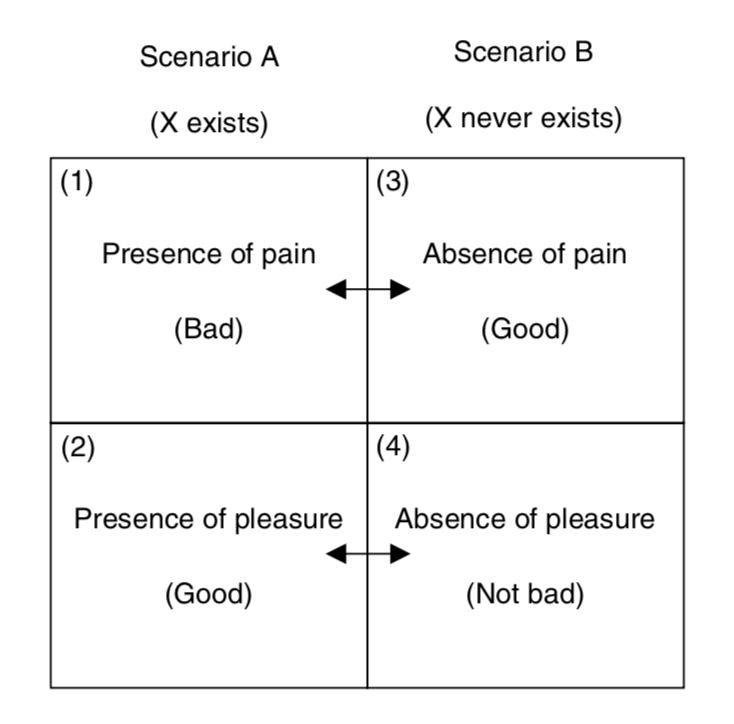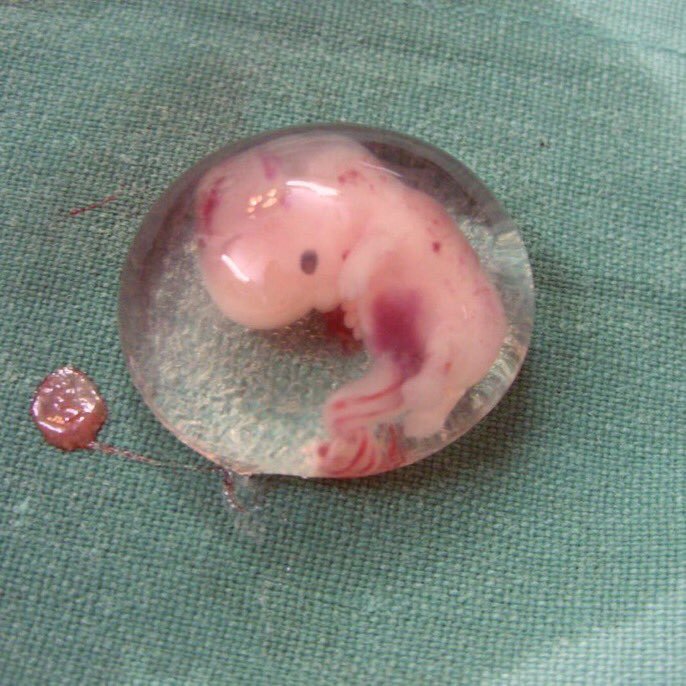- What does it mean to create life?
When you create life, you make someone addicted to pleasure/relief, and if they don’t obtain it, they will be exposed to suffering, life entails constantly facing series of suffering, like hunger, thirst, constipation, sexual frustration, fatigue, etc.
You have deprivations imposed on you, and if you fail to alleviate deprivation, you will suffer more intensely as a result of that. At its core, you are presented with the task to alleviate deprivation, if you fail to do so, it intensifies. If you alleviate it, A. another deprivation will pop up (like appetite after hunger, now you need to eat just to avoid suffering boredom) or B. the initial deprivation (hunger) is going to return in time, and you’ll have to eat again.
You have to chase pleasure your entire life or you are subjected to harm, and the relief from harm is not guaranteed before you procreate.
- Eat or hunger.
- Drink or thirst.
- Defecate or constipate.
- Ejaculate or become tense.
- Sleep or fatigue.
- Breathe or suffocate.
So on and so forth.
I think it is therefore the responsible thing to do to kill a fetus. You prevent all future suffering by doing so instead of irresponsibly creating an addiction to pleasure that you cannot guarantee will be properly satisfied, and while there won’t be any pleasure, again, it won’t be a problem either, because there won’t be an addict craving for more pleasure in the first place.
Here I’d like to bring up the concept of Benatar’s asymmetry:
- Benatar’s asymmetry:

Is the absence of pleasure really an issue if there is no one to experience it and suffer from it? Imagine this, I have both hypothetical pleasure and pain serum, if I inject said liquids into inanimate objects, they will turn conscious and either experience intense pleasure or intense pain, depending on which liquid I choose obviously.
Is injecting the pain liquid into my chair problematic? I would say yes.
Is not injecting the pleasure liquid into my chair problematic? I would say no.
- Sentience is the only important characteristic.
Badness is necessarily something that is happening in feeling organisms, the capacity to have sensations that can either be of negative or positive value, this function is enabled by a brain and nerves that have to be developed to a certain degree. A rock cannot produce badness, neither can a fertilized egg or human fetus until a certain point.
Sentience is the capacity to feel, perceive, or experience subjectively. Eighteenth-century philosophers used the concept to distinguish the ability to think (reason) from the ability to feel (sentience). In modern Western philosophy, sentience is the ability to experience sensations (known in philosophy of mind as “qualia“).
https://en.wikipedia.org/wiki/Sentience
Sentience is arguably the trait that makes it most important to avoid having certain things happen to you, such as getting run over by a car, having a knife stuck in your throat or being burned, it opens the door to very negative sensations, it’s the only thing that could make it an important priority for you to avoid it.
A tree doesn’t care if it’s being burned down, it could only generate negative sensations in the sentient organisms that may in some way care about the tree, not in the tree itself. If an asteroid hits and destroys the entire planet, that can only be bad if there are sentient organisms on said planet, otherwise it is a completely insignificant event.
The reason why it’s bad when I’m harmed is not because I contain human DNA, it is bad because I have a functioning central nervous system generating a pain response, enabling me to even be harmed, it is the only reason why I am even capable of experiencing harm in the first place.
- I think the common question of: ”Is it a human life?” is simply completely misguided to begin with, being human is not why I try to avoid being squashed.
It doesn’t matter whether or not something contains human DNA or is alive, a braindead human contains human DNA, a head of broccoli is alive too, that doesn’t make it bad to destroy a thing, many pro-lifers are simply speciesists.
If they knew they had to experience the life of a factory farmed pig getting its nuts hacked off with no anesthesia tomorrow, they wouldn’t agree to that based on their entirely misguided notion that the thing that makes not having a knife stuck in your throat important is the trait human DNA. Human life by itself is absolutely worthless, life only has extrinsic value to sentience.
It’s similar to a white slave owner accepting the torture of black slaves because they don’t contain white skin color, but having qualms about pulling the plug on his braindead white grandmother because she contains white skin color, neither white skin color nor human DNA are the characteristic that make it important to avoid torture.
Pre-sentience abortion for the ”victim” is essentially just like it’s for tomatoes when you turn them into tomato soup, it cannot matter to them.


The only two common objections I consistently hear to this type of argumentation are that:
- The fetus could become sentient in the future.
This is true of every potent sperm sample, if you don’t impede the process by flushing it down the toilet, I’m in full agreement that life starts in the testicles. Sperm lives, sperm dies, new sperm comes to life, sperm can survive in a moist environment up to 5 days.
If that argument is rejected because sperm could not ”on its own” grow into a sentient child (i.e by leeching off of a female’s body for 9 months, so not really on its own), only the morning after pill, not ejaculation would have to be a crime, as it prevents the sperm from fertilizing the egg on its own once it has been successfully ejaculated into a vagina, then realizing its potential to grow into a sentient child later on, on its own.
- The effect is the same – no suffering.
It still cannot matter to the ”subject”, so there’s no rational reason for concern because of the aforementioned point I made, I don’t think the absence of pleasure is a problem if it doesn’t result in suffering. The fact that the fetus could become sentient doesn’t matter to the fetus right now when it’s not sentient, so it can’t possibly hurt it to be aborted, if you’re purely asexual, you can’t be deprived of sex.
I like the hypothetical of sentient grassblades. Let’s say if I let grassblades grow for 9 months, they would become sentient. Would it be a problem to mow them down before they have grown for 9 months? I’d say no, because they’re not sentient yet, so they won’t even care about never becoming sentient in the future.
If I took life away from a sentient organism, it could result in some badness as their sentience enables them feel distress in response to their life being taken away, sure, the arguably living organism that is not sentient yet cannot miss anything on the other hand.
So even if there were a hypothetical tomato that could become sentient tomorrow, if I turned it into tomato soup today, it could not possibly matter.
- Coma patients are temporarily unconscious, but we don’t put them down either.
It doesn’t necessarily harm the coma patient to just not wake up again either, what could worry people though is to know that they could be legally euthanized if they were to fall into a coma one day, before they fall into that coma, because they have some kind of delusional death anxiety that they’re going to miss being alive once they’re dead.
So it doesn’t lead to badness to kill a sufficiently unconscious organism, but it could produce some suffering to legalize doing it, worrying others that they may not wake up again if they were to fall into a coma, that’s the slight distinction.
The fertilized egg/embryo/fetus was never conscious before, when it was a sperm, it never worried that if it were to fertilize an egg one day, it may be aborted by some evil, uncaring monster although it wished to become a fully conscious child one day, so in the case of an abortion as opposed to coma patients, we don’t have this whole problem.
And again, some organisms that live outside of wombs also have utility to helping others, I could argue it’s bad to pull the plug on someone who has to take care of a child, or a scientist who is about to find the cure for AIDS. We don’t live in a vacuum, the fetus kind of does.
- What if the fetus is already sentient though?
If the fetus is unfortunately already able to suffer, without any great debate now about when exactly that happens, just presupposing the fetus is, then the same goes as for every other organism, if it’s killed entirely painlessly, without any suffering involved, it still wouldn’t be bad. It cannot be intrinsically harmful, it could only be extrinsically harmful, as in:
- Family members and acquaintances might miss the painlessly killed person.
- If we legalized this act of painless killing, you may scare others they’re next in line.
- You prevented the person from reducing more suffering in other organisms.
Death is not an intrinsic harm, it can only be an extrinsic harm. This goes for late term abortion, infanticide, really any death. It’s only a problem in practice, there’s no problem with a theoretically completely painless death in principle, it prevents all future pain/suffering/harm/negative qualia.
Believing in the badness of death itself almost requires the subconscious or conscious delusion of some sort of afterlife. Even if you know that once you’re dead, it’s over, you can still be delusionally scared of things that aren’t a threat to you, arachnophobia, fear of even little spiders that you know to be harmless would be an example, and similarly irrational is fear of being dead.
Obviously, if you are dead, you no longer experience needs, wants, desires just like you didn’t before you were born, so the only thing that could be bad is your departure, you’re not going to wake up afterwards as a ghost and feel the need to come back but being unable to.
- The general utility of the right to bodily autonomy.
Another thing to point out in general is also that even if the fetus is already sentient, that doesn’t automatically mean that the harm of the abortion outweighs the harm of forced birth.
Of course, anyone’s right to bodily autonomy isn’t absolute.
It matters like anything, only because of the existence of pain. You don’t want to get raped, generally there’s no worse harm to prevent by raping you, as in, we have to rape you or otherwise we all go to hell and burn for all eternity for example, so we write on a piece of paper that person x now has a legal entitlement not to get raped for no great reason randomly.
Fair deal, if you want to violate it, it’d be good to show evidence that you’re actually going to prevent a worse harm by doing so, and this is where pro-lifers fail.
Two organisms are connected to each other here, so if the pregnancy is unwanted by the hostess (which ideally, would be all pregnancies to begin with), we are automatically forced into a situation of having to harm one by abortion or the other one by forced birth. So if the only two options are:
- harm the more sentient
- harm the less sentient
then it’s still the lesser of two sufferings to abort than to force birthing – the fetus should be sufficiently sedated though if there’s a chance that it can suffer to some degree at that point, there’s still no adequate justification to cause unnecessary (to prevent greater) harm.
Just as when you leave the door open and an uninvited intruder comes in and refuses to leave your house, you have a right to shoot them, not torture them to death over the course of three days, that’d be doing unnecessary harm to prevent the threat.
Here pro-lifers will frequently say but the fetus is innocent, the intruder chooses to harm you, therefore it’s different. This is irrelevant, a rapist with severe mental retardation, multiple personalities or schizophrenic delusions who thinks he must rape to cure world hunger and cancer is also innocent and has a good motive in mind, that doesn’t diminish the harm caused, so it’s probably still better to defend yourself.
Sometimes two organisms are connected to each other and you have to harm one either way, e.g. a cat has an ixodid tick or a tapeworm. All suffering is bad, perhaps you’ll cause some suffering to the slightly sentient tick or tapeworm, but certainly much less than if you let the parasite inside the cat’s asshole, causing worse suffering to the cat.
Pro-lifers would have more of a point if they demonstrated the suffering of the fetus to be worse, more intense than the suffering of the hostess, if pro-lifers could legitimately prove that the fetus has a soul and its soul is after the abortion forever suffering in a purgatory for aborted fetuses, getting raped by demons with pitchforks, then of course it’d be better to take that mother’s right to bodily autonomy away.
In that case, the forced-birth rhetoric would indeed start to make a lot more sense, granting bodily autonomy in that scenario would lead to a much worse outcome, but that is what makes the forced-birth view so absurd in our reality, because abortion does not lead to the more suffering producing outcome, to the contrary, it greatly prevents and reduces suffering.
UPDATE:
What if the fetus is already sentient?
That’s indeed a more complicated question, I have no qualms with anything non-sentient being killed, and technically I don’t think the painless killing of a sentient organism is a problem either.
If the non-existence before existence isn’t harmful, neither is the non-existence after you died harmful, it’s the same non-existence, and the organism won’t miss pleasure. If I’m not sad about my non-existent sibling that was never born not experiencing happiness, and I’m not upset about a potato not being able to experience happiness, why would it bother me that a corpse cannot experience happiness? They all have in common that they don’t miss it.
So what I’m saying is that all that can actually be harmful is the process of you dying and its external consequences (sad family members, friends, etc).
However, in practice I still don’t take the view that you should just walk around trying to euthanize as many people as possible, there would be practical issues with that, it would have lots of negative side effects, so it seems to me I would think this is simply a case by case kind of thing if it can be done rather painlessly, admittedly I’m not an expert on that subject – so I can’t really comment that much at what point a fetus is sentient and it might be ethically problematic to squash it, I won’t declare it’s always right.